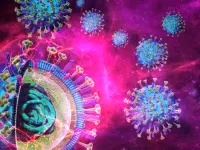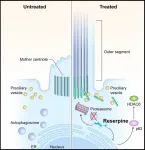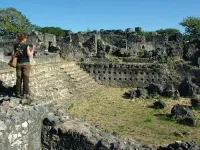(Press-News.org) Traces of ancient empires that stretched across Africa remain in the DNA of people living on the continent, reveals a new genetics study led by UCL researchers.
Published in Science Advances, the collaboration between UCL geneticists working alongside anthropologists, archaeologists, historians and linguists in Africa and beyond found evidence for when different peoples intermixed across the continent. Their findings indicate migration linked to vast empires such as the Kanem-Bornu and the kingdoms of Aksum and Makuria, as well as the spread of the Bantu language group, now spoken by close to one in four Africans.
Much of their study focused on Cameroon, where the researchers had collected the most genomes, and they show that the central African country has as much genetic diversity by some measures as the whole of Europe.
Representing one of the most densely sampled studies of African genomes to date, the study used new genetic data from more than 1,300 individuals from 150 ethnic groups from across Africa (primarily Cameroon, Republic of the Congo, Ghana, Nigeria, and Sudan, plus some more in southern Africa). By comparing genetic variation patterns between present-day people from different parts of Africa and elsewhere, they identified when intermixing occurred between different ethnic groups, which likely indicates relatively high migration at specific times and places.
First author of the study, PhD candidate Nancy Bird (UCL Genetics Institute) said: “We found evidence that roughly 600 years ago people from north and east Africa were migrating into the region of the Kanem-Bornu Empire, likely reflecting its huge impact on trade across Africa. Historical records of the empire are poor, so it is exciting to show how it possibly had such a geographically widespread impact on the continent, perhaps bringing in people from over 1,000 kilometres away.”
The Kanem-Bornu Empire, which covered present-day northern Cameroon and Chad, emerged around 700 CE and existed for more than 1,000 years, at its height spanning almost 2,000 kilometres across north and central Africa. It had vast trading networks linking northern, eastern and western Africa, resulting in genetic traces from all corners of the continent remaining in the DNA of the present-day people of Cameroon.
The study also sheds light on the Kingdom of Aksum, which encompassed northeast Africa and southern Arabia in the first millennium, and was considered one of the world's four great powers of the third century alongside contemporary empires in China, Persia and Rome, as well as the Kingdom of Makuria, which spread along the Nile in Sudan between the fifth and 16th centuries and signed one of the longest lasting peace treaties in history with Egyptian Arabic groups.
Nancy Bird said: “We see evidence of migrations from the Arabian Peninsula into Sudan during the era of the Kingdom of Aksum, highlighting its importance as a global centre around 1,500 years ago. We also see evidence of Arabic groups migrating into Sudan down the Nile, but importantly these genetic signals almost entirely originate after the peace treaty between Makuria and Egypt had started to break down.”
Furthermore, while previous studies have highlighted the wide-ranging genetic impact of the migration of Bantu speakers from Cameroon into eastern and southern Africa, this study provides compelling evidence that expansions may have also extended to the west, possibly linked to climate change.
Nancy Bird said: “There is some evidence from other researchers of climate change altering the environment around 3,000 years ago, reducing forest coverage. That this corresponds with the timings of some ancient migrations we are detecting suggests climate change may be instigating or facilitating these large-scale movements of people.”
Senior author Dr Garrett Hellenthal (UCL Genetics Institute) said: “The African continent has an immense and complicated pre-colonial history often overlooked by western curricula. The legacy of colonialism means that many events in African history have been deliberately obscured or lost. This includes the range and influence of historical African empires.”
The staggering amount of genetic diversity uncovered in this paper and other emerging studies highlights the vital importance of analysing diverse African genomes from across the continent.
Dr Hellenthal added: “Despite the clear insights into medicine and human history that studying the immense genetic diversity found among African peoples can provide, African genomes have been, and still are, underrepresented in genetic studies compared to other regions of the world.”
Co-author Dr Forka Leypey Matthew Fomine (University of Buea, Cameroon) said: “There are still lots of ethnic groups, for example in Cameroon, that have not yet been studied, whose genomes likely hold many other secrets. We have the capability to collect these samples and are looking for interested collaborators.”
The study, supported by the BBSRC, Natural Environment Research Council, Wellcome, Royal Society and the National Institute for Health Research UCLH Biomedical Research Centre, involved researchers at UCL and other institutions in the UK, Cameroon, Ghana, Sudan, Canada, China, France, Finland, and the US.
END
Ancient African empires’ impact on migration revealed by genetics
2023-03-29
ELSE PRESS RELEASES FROM THIS DATE:
Method for improving seasonal flu vaccines also aids pandemic prediction
2023-03-29
(MEMPHIS, Tenn. – March 29, 2023) Improving the seasonal influenza vaccine and public health specialists’ ability to predict pandemic potential in new flu strains may be possible due to new findings from scientists at St. Jude Children’s Research Hospital. The key is the stability of a viral protein that gains entry into human cells. The findings were published today in Science Advances.
“We found that the protein flu viruses use to enter cells, hemagglutinin, needs to be relatively stable and resistant to acid in an effective H3N2 flu vaccine,” said senior and co-corresponding ...
Model for predicting transmission of COVID-19 can help policymakers monitor virus, inform health surveillance systems
2023-03-29
The COVID-19 pandemic presents unprecedented challenges to public health worldwide. Tracking the dynamics of the coronavirus permits governments, organizations, and individuals to make projections in an effort to curb the spread of the pandemic. But while a large amount of data about COVID is collected and publicly available, the information can be unreliable and subject to bias. In a new study, researchers analyzed data from Cali, Colombia, to develop a model that provides a template for tracking data, predicting transmission, and informing health surveillance systems.
The study was conducted by researchers at Carnegie Mellon ...
FDA-approved drug shows promise in lab models for blinding childhood disease
2023-03-29
A National Eye Institute-led team has identified a compound already approved by the U.S. Food and Drug Administration that keeps light-sensitive photoreceptors alive in three models of Leber congenital amaurosis type 10 (LCA 10), an inherited retinal ciliopathy disease that often results in severe visual impairment or blindness in early childhood.
LCA 10 is caused by mutations of the cilia-centrosomal gene (CEP290). Such mutations account for 20% to 25% of all LCA – more than any other gene.
Using a mouse model of LCA10 and two types of lab-created tissues from stem ...
OHIO diabetes researchers discover the potential of CIDEC protein to mitigate obesity-related cardiometabolic disease
2023-03-29
A team of researchers from Ohio University’s Heritage College of Osteopathic Medicine recently discovered a novel role of human-CIDEC gene in improving metabolic dysfunction and cardiovascular health. The study, “Endothelial-Specific Expression of CIDEC Improves High-Fat Diet–Induced Vascular and Metabolic Dysfunction,” published in Diabetes focuses on vascular function and its association with metabolic diseases like insulin resistance, Type 2 diabetes, and cardiovascular disease.
“This is a very impactful study, and we have moved in the right direction to find a way to reduce cardiovascular ...
The COVID-19 pandemic has increased – but also polarised – trust in science
2023-03-29
Research by the Milner Centre for Evolution at the University of Bath, UK, along with colleagues at Universities of Oxford and Aberdeen, finds that trust in scientists has hugely increased overall since the COVID-19 pandemic, but that attitudes have also become more polarized. The study also found that people were more likely to take the COVID-19 vaccine if their trust in the science had increased.
Whether it be climate change, vaccines or GM foods, trust in science and scientists has rarely been more important. ...
DoD funds new project aimed at protecting global supply chains, infrastructure
2023-03-29
Thanks to the work of Arizona Sen. Mark Kelly, a new project led by Northern Arizona University, with various collaborators throughout the nation, will help the United States better protect the critical supply chain infrastructure and the supply chains that keeps the country and its economy running.
Benjamin Ruddell, professor in the School of Informatics, Computing, and Cyber Systems and founder of the FEWSION project, is the NAU lead. Funded at $8 million for year one, the project aims to work with technology known as Fused Global Data Analytics and Visualization. The team’s leadership, ...
CNIO researchers help to understand the functioning of the protein that makes DNA loops in the human genome
2023-03-29
Cohesin is a ring-shaped protein that surrounds and moves around the DNA molecule, forming the loops. It is a crucial process for the cell.
Understanding how cohesin works has been one of the challenges of molecular biology in recent decades.
The work now published by Ana Losada's group at CNIO will serve to deepen our understanding of the disease known as Cornelia de Lange syndrome.
At the end of the 1990s, Ana Losada, a researcher at the Spanish National Cancer Research Centre (CNIO), then at the Cold Spring Harbor Laboratory (New York, USA), discovered a protein in frogs of the Xenopus genus that is fundamental to ...
AI could set a new bar for designing hurricane-resistant buildings
2023-03-29
Being able to withstand hurricane-force winds is the key to a long life for many buildings on the Eastern Seaboard and Gulf Coast of the U.S. Determining the right level of winds to design for is tricky business, but support from artificial intelligence may offer a simple solution.
Equipped with 100 years of hurricane data and modern AI techniques, researchers at the National Institute of Standards and Technology (NIST) have devised a new method of digitally simulating hurricanes. The results of a study published today in Artificial Intelligence for the Earth Systems demonstrate that the simulations can accurately ...
Caesarean Scar Disorder: International study led by Amsterdam UMC defines a clinical condition
2023-03-29
More than 30% of women who give birth by caesarean section suffer from long-term symptoms, such as abdominal pain, blood loss or fertility problems. These symptoms are caused by an abnormal uterine scar. This condition is defined now for the first time, thanks to an international study led by Amsterdam UMC, as Caesarean Scar Disorder (CSDi). This gives women recognition for these problems after a caesarean section. In addition, international studies on CSDi can now be better compared with each other, providing more insight into treatment options. The research is published today in JAMA Network Open.
In ...
Ancient DNA reveals African and Asian ancestry of medieval Swahili people
2023-03-29
People living on the ‘Swahili coast’ - the Indian Ocean coast of eastern Africa - have African and Asian ancestry according to new research on ancient DNA.
Archaeologists believe that the results, based on finds from excavations, including those directed by Professor Stephanie Wynne-Jones from the University of York and Professor Jeffrey Fleisher at Rice University, confirm that relationships between Asian merchants and African traders were formed between the years 900 and 1100 in ...



